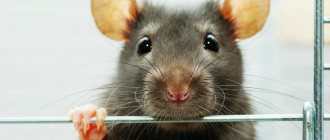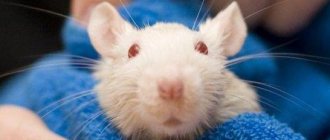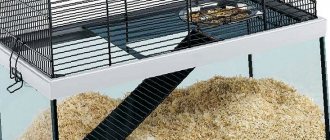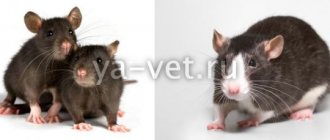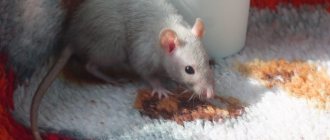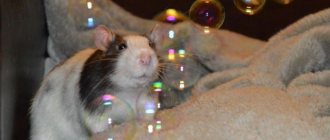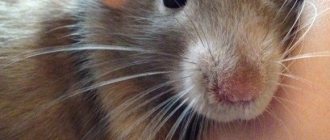Spaying or neutering your pet rat is common practice among dedicated and loving rat owners. On the one hand, the procedure offers many benefits for your pet rat, especially female rats. However, as with most surgical procedures, there are risks that need to be considered before subjecting your beloved pet rat to the stress of surgery and recovery.
Before performing an invasive procedure on your rat, take the time to learn about the pros and cons of neutering rats and how to care for your rat before and after surgery.
Pros and cons of spaying/neutering rats
Pros:
- May reduce aggression in male rats.
- Reduces the risk of breast tumors in females.
- Reduces the risk of pituitary tumors if surgery is performed between 3 and 6 months of age.
- Allows you to keep males and females together.
- In males, the coat softens and weight decreases.
Minuses:
- Painful recovery.
- Risk of complications after surgery, including death.
- The procedure can be expensive.
- After surgery, male and female rats often experience weight gain.
Period after surgery
The veterinarian who operated on the animal will tell you in detail about the care that the rodent needs during the recovery period. The owner of the animal must strictly follow the instructions and recommendations of the doctor, in this case the pet will quickly return to normal and return to a full life. The main general rules for caring for your pet during the postoperative period include:
- Body temperature control. If necessary, a pet recovering from anesthesia should be placed sideways on a heating pad and covered with a blanket.
- Compliance with the diet. During the first day after surgery, the animal can be given half of its normal daily diet. If the pet does not have postoperative complications, from the second day it is allowed to feed as usual.
- Protection from external factors. Until the stitches are completely healed, the animal must walk in a special blanket. In addition, during the recovery period, the operated pet should not be allowed to come into contact with other animals so that they do not harm the weakened animal.
When to spay or neuter a rat
Although rats reach sexual maturity at about 4 or 5 weeks, the recommended age for spaying and neutering is 3 to 6 months.
Depending on your situation, this may mean installing a second cage to separate the sexes until the procedure is complete.
Spaying or neutering pet rats is an optional procedure and should only be done in cases of extreme aggression or to reduce the risk of mammary tumors in female rats.
How is the operation performed?
There is a difference in terms: castration means the complete removal of all organs of the reproductive system, and sterilization means ligation of the fallopian tubes or seminal ducts, as well as partial removal of organs. Most often, rats are castrated, as this reduces the risk of tumors. The younger the animal, the more likely it is to tolerate anesthesia and the operation itself. Therefore, it is recommended to perform the operation at the age of 3-5 months.
The technique of castration of decorative rodents is very similar to a similar operation in cats. But a number of points make it more complicated. In rats, due to their small size, it is impossible to obtain convenient surgical access; the tissues of the organs are thinner, and the intestines take up more space. The suturing technique is also slightly different and special threads are used. Therefore, the doctor must have the necessary experience in performing surgical operations on small rodents.
There is no need to pre-prepare the rat for surgery. If you have a group of animals, you will need a separate cage or carrier for the few days while the stitches heal.
It is better to feed the animal at least two hours before the procedure. Sterilization of a rat takes from 15 to 30 minutes and is carried out only under general anesthesia. The stitches are made with absorbable thin threads, so they do not need to be removed.
The postoperative period will differ depending on the type of anesthesia - you must strictly follow the doctor's instructions.
Until the stitches heal, the pet rat spends all its time in a special blanket - you can purchase it at a pet store or clinic, or sew it yourself. Also, it will not be possible to allow other pets near her for communication and play - they can bite through the strings of the blanket, causing accidental injury to an animal with limited movements. It is recommended to place the rat in a carrier or terrarium with smooth walls - this will eliminate the risk of seams coming apart from sudden movements and jumping, and the pet will avoid the danger of falling and getting hurt.
Should male pet rats be neutered?
Some rat owners decide to have their male rats neutered. There are several good reasons why you might want to spay your male rat.
The first reason is the male’s excessive aggression towards other rats. If your male rats are too aggressive towards each other, you may want to consider neutering them. However, take a few things into account.
If you neuter one male rat, you must neuter all of them. After all, if you castrate only one male rat, the lack of testosterone may cause other male rats to think that the spayed rat is a female. So make your decision based on whether to neuter all of your rats, not just one.
One more thing to consider. Rare fights between males are normal. Many rat owners have the philosophy that if there is no blood, then everything is fine when it comes to their fights. But if your rats seriously look like they have problems with each other - constant aggressive behavior, frequent fighting, bloodletting - then you may want to consider neutering them.
If your rats really have a problem with each other, things can get dangerous and one can kill the other. However, keep in mind that this is very rare, and it is much more likely that your rats are just playing fighting.
Another reason for spaying and neutering is that owners want to keep male and female rats together. Most rat owners will only have boy rats or just girl rats. If they have both, they will always keep them separate. Or, if they let them stay together, they'll be prepared to have a ton of new rat babies.
But if you want to keep male and female rats together and don't want to raise baby rats, you really need to spay the male rats and neuter the female rats. Otherwise you will soon have a lot of baby rats.
Medical indications
Castration of rats is sometimes prescribed by a doctor when other diseases of the animal affect the reproductive system and removal of organs is necessary for a cure. Usually these are various inflammatory diseases, cysts, neoplasms in the reproductive organs and mammary glands. There may also be other medical indications:
- age of the rat - even if animals are used to produce offspring, females from the age of one year are usually removed from breeding and sterilized, since the risk of their death during childbirth is high;
- diseases, exhaustion, vitamin deficiency - such animals are also excluded from breeding;
- a high level of aggression of the animal towards the owner - castration of a rat does not provide a 100% guarantee, but it often turns out to be an effective remedy.
Recently, surgery has become increasingly popular to prevent the development of cancer. Rats indeed very often develop neoplasms, and mostly in the area of the reproductive system. But there is still no direct connection, so it will not be possible to reliably protect the animal through sterilization.
Should female rats be spayed?
The main reason why rat owners decide to neuter their female rats is that it can reduce the likelihood of them contracting mammary tumors.
Female rats are highly likely to develop tumors during their lifetime. The chance can be reduced if you get your rats from a reputable breeder and make sure the rats eat a healthy diet.
But if you really want to reduce the chance of them getting tumors when they get older, you can have them spayed while they're still young (a couple of months at most).
The need for such an operation
In all rodents, the main reproductive feature is high reproduction rates. The age of puberty in ornamental rats is 4 months, while pregnancy lasts 3 weeks.
Did you know? Many species of rodents appeared on the planet long before humans. Rats as a species formed about 60 million years ago at the beginning of the Paleogene period.
In one litter, up to 20 small rodents can be born. If you are the owner of a mixed pair of rats, spaying and neutering is truly necessary to avoid a sharp increase in the number of pets. In the case where two males are kept, this procedure is also necessary to reduce the aggressiveness of rodents.
When it is necessary to do it
Castration is mandatory in cases where it was prescribed by a veterinarian. Doctors usually recommend this operation in cases where the rat’s illness affects the reproductive system, surgical intervention of which will relieve the animal of the disease.
Commonly encountered diseases include:
- inflammation;
- cyst;
- tumors.
Important! Keeping rats in the same room but in different cages can cause severe stress for your pets. This is due to the fact that rodents are school animals and need to communicate with other members of their species.
The latter should be treated with the greatest caution, since decorative rats often suffer from cancer that affects the reproductive system of both females and males. The former may develop malignant tumors in the area of the uterus, ovaries and mammary glands. Males often suffer from tumors on the testes.
Castration and sterilization can act as preventive measures for these diseases. If the operation is performed at a young age, the animal’s body will experience significantly less stress. For females, sterilization, among other things, has a preventive effect on pituitary gland diseases.
Preoperative preparation for sterilization and castration of rats
If your pet rat is prone to respiratory illness, your veterinarian may prescribe antibiotics for a few days before surgery. This will ensure that the animal is healthy enough to undergo surgery and will reduce the risk of infection after the procedure.
Unlike cats and dogs, your pet rat does not need to fast before surgery. Rats cannot vomit or regurgitate, so there is no risk of accidentally inhaling regurgitated food or stomach acid while under anesthesia.
Fasting can be dangerous because it reduces energy reserves and makes rats more susceptible to dehydration and hypoglycemia. In some cases, fasting can be dangerous because it can alter the rat's response to the anesthetic.
Inhalational anesthetic is safer than injection in rats because the dose is easier to measure. If your veterinarian does not use an inhalational anesthetic, do not proceed with the surgery.
Types of anesthesia
In almost all cases of castration and sterilization, general anesthesia is used. Only if it is contraindicated for a particular animal, it is replaced with local anesthesia. The type of anesthesia used will affect your pet's post-operative care.
According to the type of administration, anesthesia is:
- injection (intramuscular);
- inhalation;
- intravenous.
Injection anesthesia is the most dangerous. This is due to the following:
- most painkillers are highly toxic;
- there is no way to control the condition of an anesthetized animal;
- After administration of the drug, it is no longer possible to adjust the depth of anesthesia.
Despite this, doctors believe that anesthesia administered intramuscularly reduces pain and alleviates the rodent's condition after surgery.
Inhalation anesthesia is carried out by supplying anesthetic gas through a special mask. This method reduces the likelihood of negative consequences of anesthesia and all kinds of risks to a minimum. The amount of drug inhaled by the rat is regulated. At the same time, there is no negative effect on internal organs and the liver in particular. But this option for pain relief is the most expensive, since it requires expensive drugs and special equipment.
The best option is intravenous anesthesia. During the operation, the drug enters the animal’s body through the tail vein. This method combines optimal cost and safety.
Postoperative care of rats
If no complications arise, the rat should be sent home the same day. This will reduce stress levels and make the recovery process easier for your pet rat. A reputable veterinarian will show you what the incision looks like and note any warning signs.
While the rat is recovering, it should be kept in a small cage separate from other rats for at least one full day. A cat carrier works well for this purpose as it is more confined and limits unnecessary movement.
It is important to keep the rat warm during and after surgery because the anesthetic interferes with body temperature regulation. You can keep your rat warm by using a covered heating pad, but you will need to be careful that the rat does not overheat and try to chew it.
Your veterinarian may prescribe antibiotics and pain relievers to reduce the risk of infection and help your rat feel more comfortable. It is important to follow the instructions carefully and complete the full course of antibiotic treatment unless otherwise directed.
Check the incision regularly for signs of infection such as redness, pus, and swelling.
After 24 hours, the neutered female rats can be reintroduced to their cage mates, but you must ensure that no one tries to disturb the incision. After 7-10 days, your female rat should be well enough to run, climb, and play with her cage mates.
Male rats may take up to 3 weeks to fully recover. It may take 6 to 8 weeks for aggressive behavior to change.
Prices for treatment of rats
| Name of veterinary services | Unit | Price, rub |
| ⭐ Initial appointment | 1 animal | 400 |
| ⭐ Repeated appointment | 1 animal | 250 |
| Initial appointment with a specialist | 1 animal | 1100 |
| Consultation without an animal | — | 550 |
| Consultation with a doctor based on test results | 1 PC. | 400 |
| Weighing animals | 1 animal | For free |
| Additional fixation for aggressive animal behavior | 1 animal | 700 |
CLINIC REGISTRATION
HOME CALL
Complications after spaying and castrating rats
In addition to signs of infection, you need to check your rat for the following complications:
- Sudden bleeding.
- Reopening the incision site.
- Abnormal breathing.
- Excessive lethargy.
- Lack of appetite, thirst.
- Postoperative abscesses.
Complications resulting from spaying or neutering can range from mild (minor infection) to severe (respiratory or heart failure). Therefore, it is extremely important to keep a close eye on your pet rat and seek immediate veterinary help if necessary.
To avoid complications, follow these recommendations:
- Make sure your veterinarian is experienced in spaying and neutering rats.
- Ask all important questions in advance.
- Avoid surgery if the risks outweigh the benefits (older age, prone to infections, etc.)
- Check the rat for complications.
Advantages and disadvantages
Castration of rats has positive and negative sides and can be carried out at the request of the owner, except in cases where the operation was prescribed for medical reasons.
Among the advantages, the following should be noted:
- the possibility of keeping opposite-sex couples in the same cage;
- prevention of many deadly diseases;
- increasing the lifespan of a pet;
- possible reduction in animal aggression;
- improving the appearance of the rodent due to the normalization of the functioning of the sebaceous glands.
We recommend learning how to properly bathe a rat at home.
Therefore, the number of positive effects is large.
However, they face disadvantages such as:
- the need to carefully monitor your pet’s diet due to metabolic disorders;
- the inability to accurately predict the complete decrease in the animal’s aggressiveness;
- poor tolerance of painkillers and anesthesia by rodents.
The last point is the most unpleasant: due to the small size of decorative rats, it is very easy to make mistakes in medication dosages. It is for this reason that you cannot contact an untested and inexperienced veterinarian to castrate an animal. An error in the amount and strength of anesthesia can cause death.
